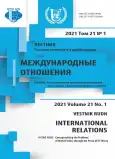Eurasian Concept: Central Asia in Russian and Chinese Foreign Policy
- Авторлар: Zabella A.A.1, Katkova E.Y.1, Shabaga A.V.1
-
Мекемелер:
- RUDN University
- Шығарылым: Том 21, № 1 (2021): Conceptualizing the Problems of World Politics through the Prism of IR Theory
- Беттер: 79-90
- Бөлім: THEMATIC DOSSIER
- URL: https://journal-vniispk.ru/2313-0660/article/view/320331
- DOI: https://doi.org/10.22363/2313-0660-2021-21-1-79-90
- ID: 320331
Дәйексөз келтіру
Толық мәтін
Аннотация
This article focuses on the reasons for both increasing attention to Eurasian ideology among political and scientific circles in Russia and the Chinese interest in Central Asia. Given a realistic paradigm, the authors analyzed aspects of Russian and Chinese foreign policy in the context of strengthening their influence in the region. Based on traditional values the ideology of Eurasianism is considered as a basis of Russia’s foreign policy in Central Asia. The authors paid attention to an analysis of the effectiveness of the Russian concept of Eurasianism and the Chinese initiative “the Belt and Road Initiative”, reminiscent of the Silk Road, in Central Asia. The paper covers theoretical-analytical and systemic-historical methods that offered an opportunity both to analyze the approaches of Russia and China to strengthen their influence in Central Asia and to examine the possibilities and contradictions of cooperation between Russia and China in Central Asia. The authors consider an interface among the EAEU and “the Belt and Road Initiative” as an opportunity to increase the efficiency of Russian-Chinese interaction, to create significant benefits to the countries in the Central Asia, and to expand the Russian and Chinese presence in the region. The authors pointed out the strengths and weaknesses of Russia and China in their interaction with the countries of Central Asia. Although Russia enjoys significant advantages, China is strengthening its presence in the region by its investments. The main hypothesis of this article is that the interface among the EAEU and “the Belt and Road Initiative” initiatives may curb competition between Russia and China in Central Asia, but the authors do not rule out the Shanghai scenario, which demonstrates a gradual strengthening of China’s position.
Негізгі сөздер
Авторлар туралы
Anastasiya Zabella
RUDN University
Хат алмасуға жауапты Автор.
Email: zabella-aa@rudn.ru
PhD in History, Senior Lecturer, Department of Theory and History of International Relations
Moscow, Russian FederationEvgeniya Katkova
RUDN University
Email: katkova-eyu@rudn.ru
PhD in History, Senior Lecturer, Department of Theory and History of International Relations
Moscow, Russian FederationAndrey Shabaga
RUDN University
Email: shabaga-av@rudn.ru
Dr. of Sc. (Philosophy), Professor, Department of Theory and History of International Relations
Moscow, Russian FederationӘдебиет тізімі
- Aristova, L.B., & Semenova, N.K. (2019). Russia and China in Eurasia: Transport Security Dimensions. Part 1. Moscow: Institut vostokovedeniya RAN publ. (In Russian).
- Bordachev, T.V. (Eds.). (2019). Towards the Great Ocean: A Chronicle of the Turn to the East: collection of reports of the Valdai Club. Moscow: Fond razvitiya i podderzhki Mezhdunarodnogo diskussionnogo kluba “Valdai” publ. (In Russian).
- Broomfield, E.V. (2003). Perceptions of Danger: The China Threat Theory. Journal of Contemporary China, 12(35), 265—284. doi: 10.1080/1067056022000054605
- Brzezinski, Z. (2016). The Grand Chessboard: American Primacy and Its Geostrategic Imperatives. New York: Basic Books.
- Butler, W.E., Entin, M.L., Entina, E.G., & Torkunova, E.A. (2020). Greater Eurasia: In Search of a Legal Order. Polis. Political Studies, (4), 9—23. doi: 10.17976/jpps/2020.04.02
- Cai, P. (2017). Understanding China’s Belt and Road Initiative. Sydney: Lowy Institute for International Policy.
- Cheng, G., Chen, L., Degterev, D.A., & Zhao, J. (2019). Geopolitical Implications of China’s “One Belt One Road” Strategy. Vestnik RUDN. International Relations, 19(1), 77—88. doi: 10.22363/2313-0660-2019-19-1-77-88
- Eurasianism: Declaration, Formulation, Theses. (1932). Prague: Izd. Evraziytsev publ. (In Russian).
- Florovsky, G. (1998). Out of the Past Russian Thought. Moscow: Agraf publ. (In Russian).
- Humboldt, A. (1915). Central Asia. Vol. 1. Moscow: Tipolitografiya t-va I.N. Kushnerev i Ko publ. (In Russian).
- Korolev, A. (2020). How Closely Aligned Are China and Russia? Measuring Strategic Cooperation in IR. International Politics, (57), 760—789. doi: 10.1057/s41311-019-00178-8
- Lamansky, V.I. (2010). Geopolitics of Pan-Slavism. Moscow: Institut russkoi tsivilizatsii publ. (In Russian).
- Lebedeva, M.M. (2020). New World Order: Parameters and Possible Contours. Polis. Political Studies, (4), 24—35. (In Russian). doi: 10.17976/jpps/2020.04.03
- Leontyev, K. (2000). The Average European as an Ideal and a Weapon of Worldwide Destruction. Moscow: AST, AST Moskva, Khranitel’ publ. (In Russian).
- Lukin, A.V. (2015). Rising China and the Future of Russia (Works on China and Russian-Chinese Relations). Moscow: Mezhdunarodnye otnosheniya publ. (In Russian).
- Lukin, A.V. (2020). Russia and China in Greater Eurasia. Polis. Political Studies, (5), 46—59. (In Russian). doi: 10.17976/jpps/2020.05.04
- Makarov, I.A., & Sokolova, A.K. (2016). The Eurasian Economic Union and the Silk Road Economic Belt: Opportunities for Russia. International Organizations Research Journal, 11(2), 40—57. (In Russian).
- Nikonov, V.A. (2015). Civilization Code. What Awaits Russia in the Future World. Moscow: Eksmo publ. (In Russian).
- Popov, D.S. (2020). Tajikistan’s Foreign Policy Dealing with the Central Asian Countries: Issues and Dynamics of Relations. Problems of National Strategy, (4), 102—120. (In Russian).
- Savchenko, A.E., & Zuenko, I.Y. (2020). The Driving Forces of Russia’s Pivot to East // Comparative Politics Russia, (11), 111—125. (In Russian). doi: 10.24411/2221-3279-2020-10009
- Savitsky, P.I. (1997). Geographic and Geopolitical Foundations of Eurasianism. In A.G. Dugin (Eds.), Fundamentals of Geopolitics. Moscow: ARKTOGEYa-tsentr publ. (pp. 294—298). (In Russian).
- Torkunov, A.V., Streltsov, D.V., & Koldunova, E.V. (2020). Russia’s Pivot to the East: Achievements, Problems, and Prospects. Polis. Political Studies, (5), 8—21. (In Russian). doi: 10.17976/jpps/2020.05.02
- Winter, T. (2020). Geocultural Power: China’s Belt and Road Initiative. Geopolitics, 1—24. doi: 10.1080/14650045.2020.1718656
- Ye, M. (2015). China and Competing Cooperation in Asia-Pacific: TPP, RCEP, and the New Sill Road. Asian Security, 11(3), 206—224. doi: 10.1080/14799855.2015.1109509
- Yilmaz, S., & Liu, C. (2019). Remaking Eurasia: The Belt and Road Initiative and China — Russia Strategic Partnership. Asia Europe Journal, 18(3), 259—280. doi: 10.1007/s10308-019-00547-1
- Zhao, Hong. (2016). Trends in Southeast Asia: China’s One Belt One Road: An Overview of the Debate. Singapore: Mainland Press.
- Zhao, Huasheng. (2018). Greater Eurasian Partnership: China’s Perspective. China International Studies, (68), 68—84.
Қосымша файлдар









